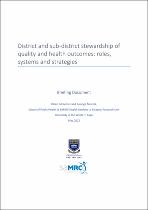District and sub-district stewardship of quality and health outcomes: roles, systems and strategies
Abstract
Sub-district and district health systems – generically referred to as the meso-level – are key
to enhancing quality of care and improving health outcomes. Facility (micro) level
improvement strategies are less likely to succeed or be sustained if they are not supported
and enabled by the meso-level.
In this briefing document, we explore district and sub-district stewardship of quality of care
and health outcomes, based on insights and experiences of a national initiative referred to
as Mphatlalatsane. This initiative seeks to improve maternal and neonatal health in selected
districts of three provinces (Mpumalanga, Limpopo and Eastern Cape). As part of the wider
evaluation of Mphatlalatsane, we conducted serial interviews with project partners over the
course of 2020 and 2021, specifically probing views on the meso-level in relation to
maternal and neonatal health (MNH) quality and outcomes. Drawing on these interviews
and programme documentation, we seek to characterize both the ‘what’ and ‘the how’ of
meso-level stewardship of quality and outcomes, including roles/capabilities, enabling
systems and change strategies. We believe the insights generated offer guidance on system
functioning that can complement clinical guidelines and standards, and feed into debates on
the design of district and sub-district health systems in South Africa.
To achieve better quality and health outcomes (whether for MNH or other programmes),
the meso-level needs to be able to: drive implementation of provincial and national
strategy, while simultaneously advocating for bottom-up service delivery needs; authorise
and support innovation by frontline providers, drawing on improvement methodologies;
coordinate health programmes and players across levels of the health system; and ensure
appropriate accountabilities. These roles imply a high degree of agency and responsiveness
on the part of the meso-level, proactively connecting elements of the system, problemsolving, learning, allocating resources and exploiting efficiencies.

